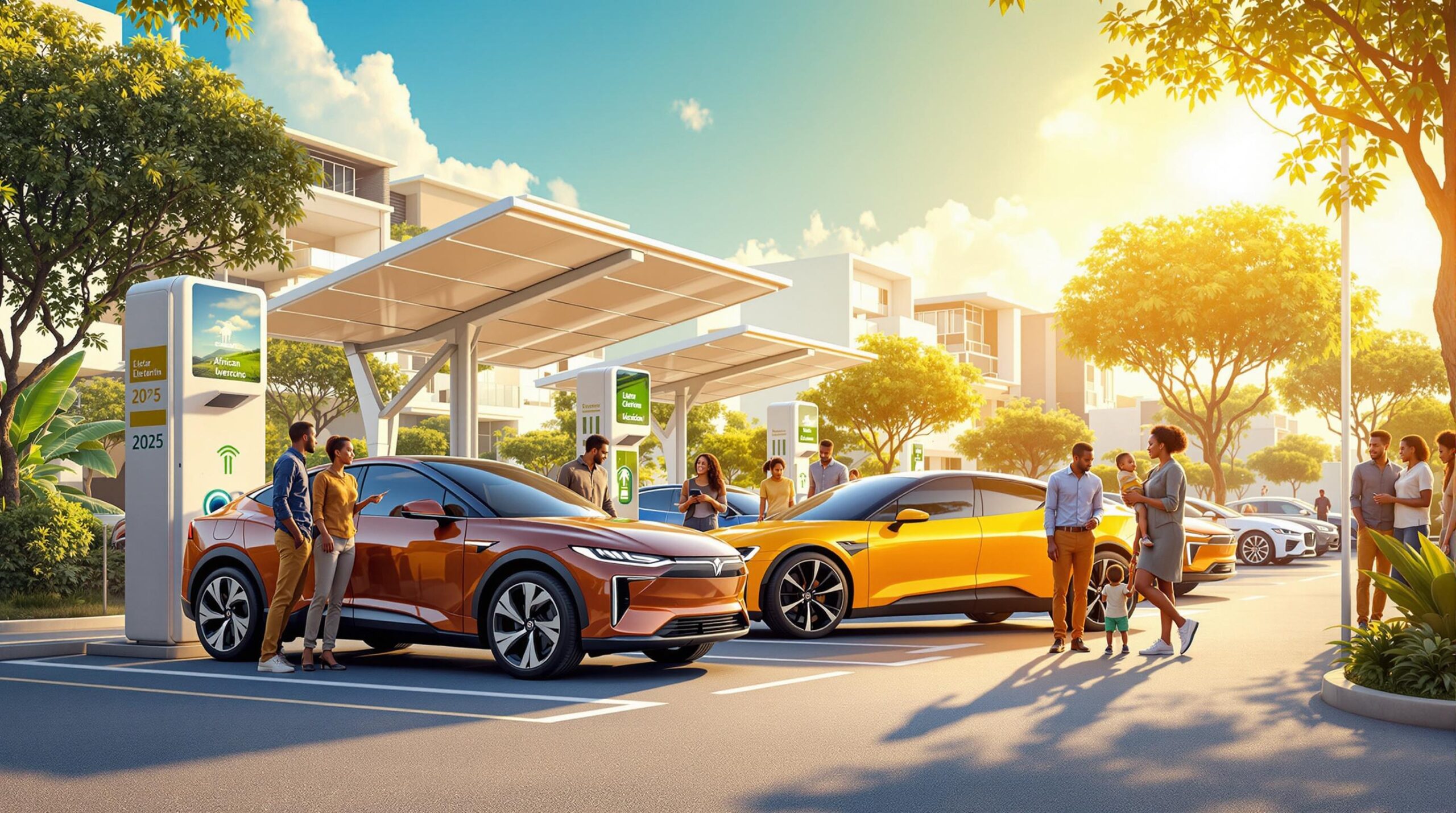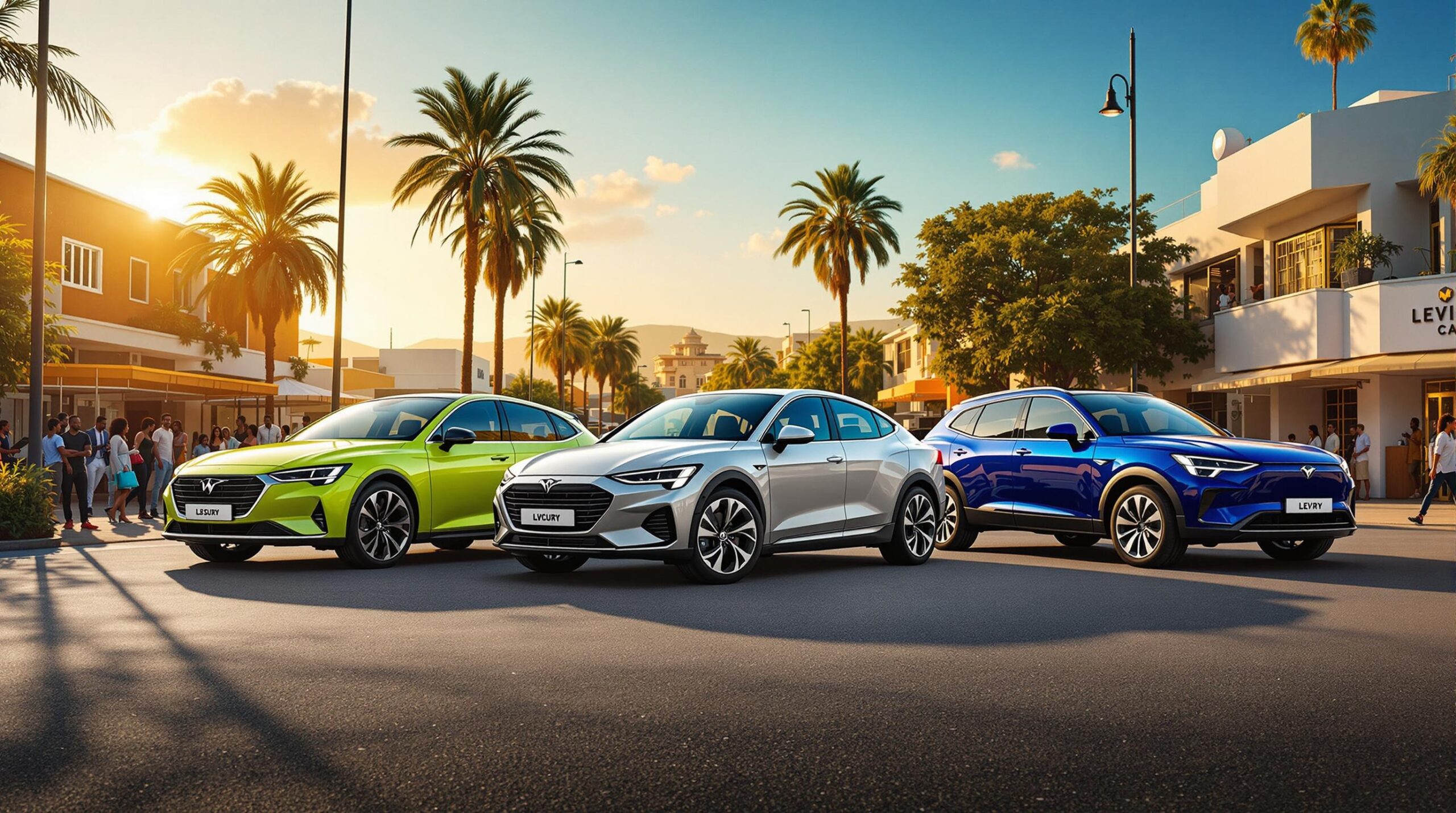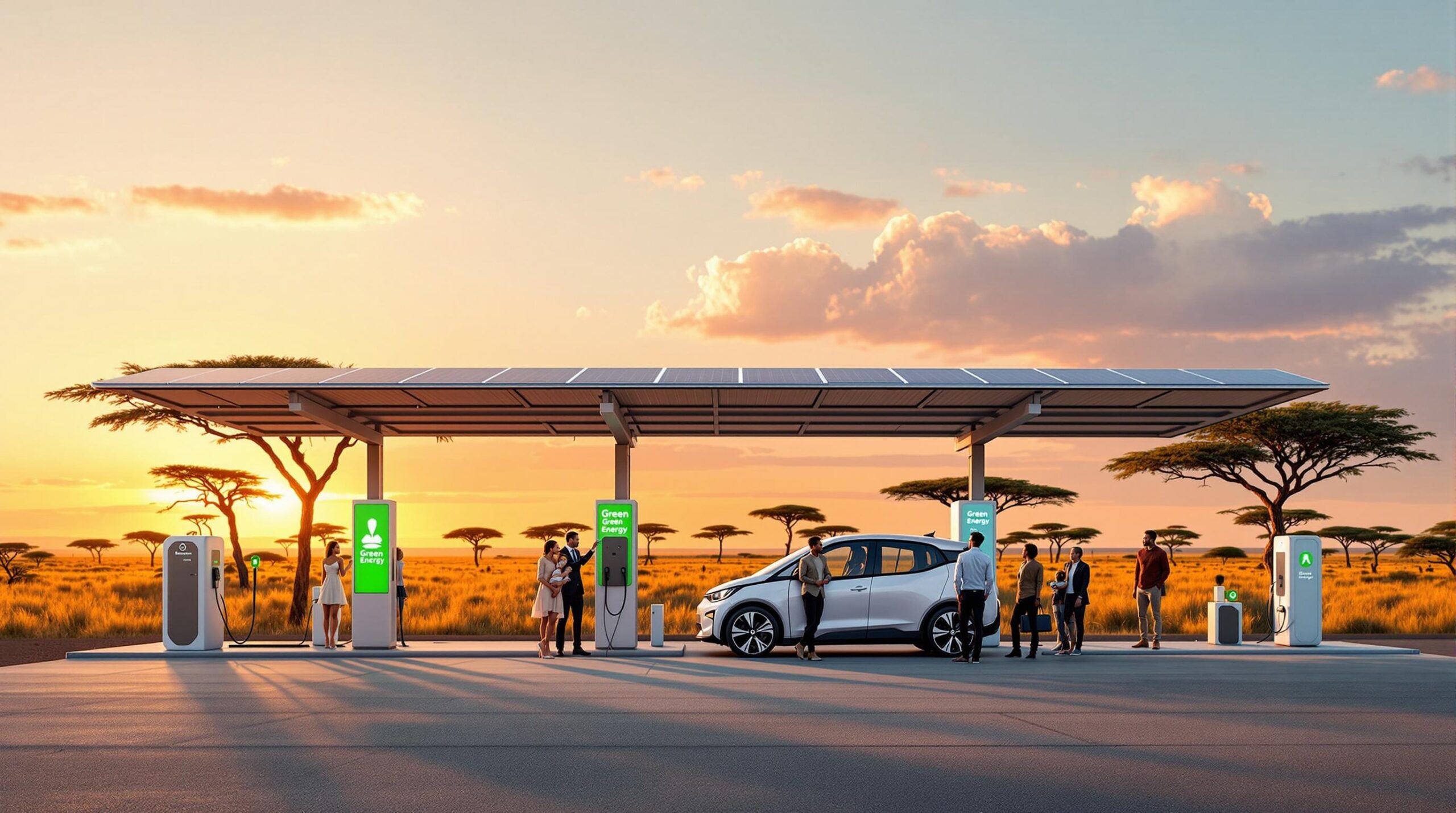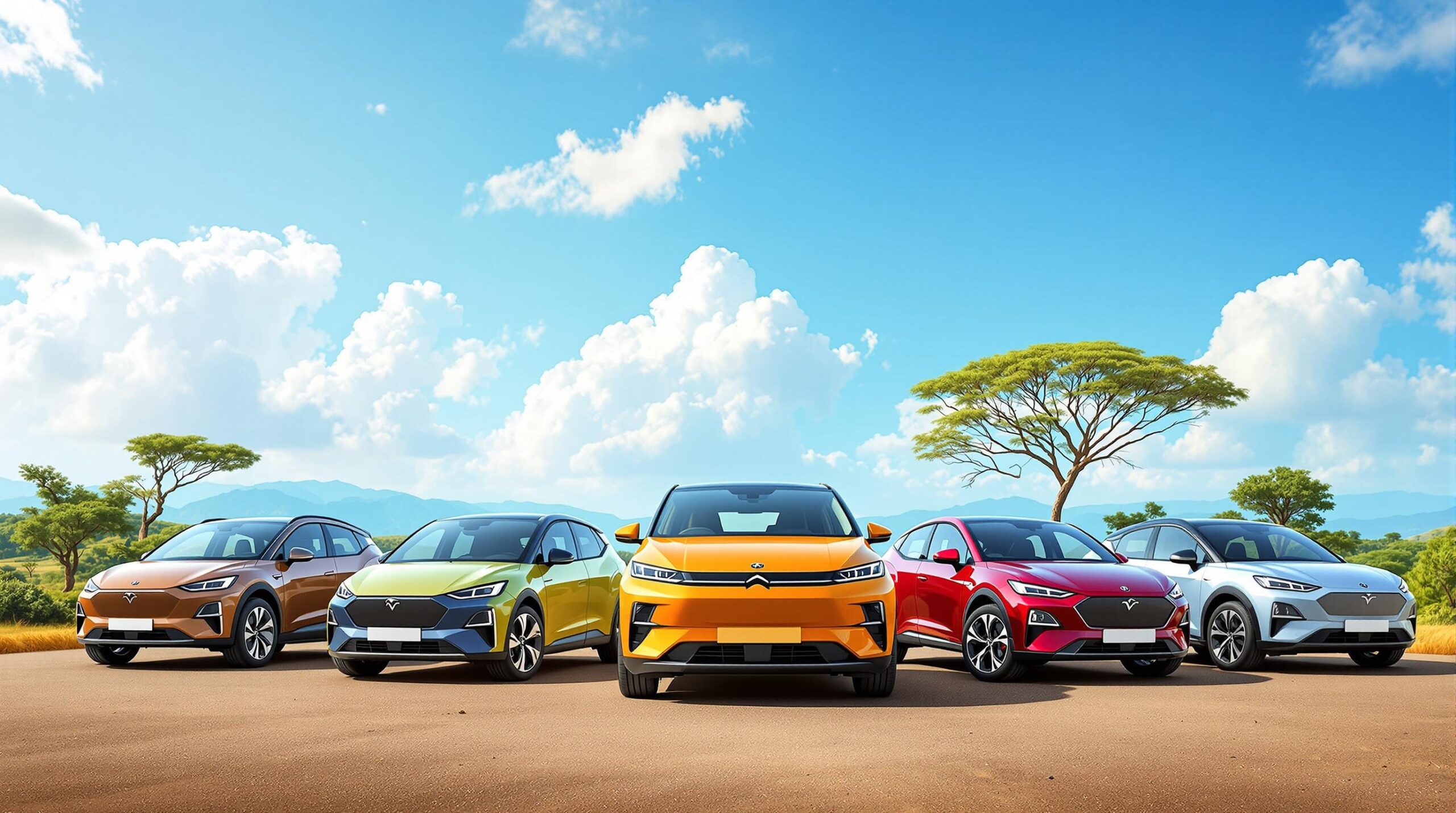
The electric vehicle (EV) market in Africa is growing fast, offering more affordable and diverse options for buyers. Here’s what you need to know:
- Affordable EVs: Chinese brands are leading with budget-friendly models like the GEELY PANDA MINI BASE ($5,880) and LINGBOX UNI ($4,800).
- Premium Options: High-end EVs like the BYD YUAN PRO ($10,880) and luxury models like the AITO M9 EV are gaining popularity.
- EV24.africa: A platform simplifying EV purchases across Africa with services like financing, logistics, and registration.
- Government Support: Tax benefits (e.g., South Africa’s 150% deduction for EV production) and charging infrastructure improvements are driving adoption.
- Market Growth: The African EV market is projected to grow from $209.9M in 2025 to $314.1M by 2029, with a 10.60% annual growth rate.
With lower running costs, reduced emissions, and expanding infrastructure, now is a great time to explore EVs in Africa. Platforms like EV24.africa make ownership easier with flexible payment plans and support for buyers across all 54 African countries.
Burkina Faso unveils first locally produced electric vehicle model
Main Factors Driving EV Growth in Africa
Current Laws and Tax Benefits
Governments across Africa are introducing policies to accelerate the shift to electric vehicles (EVs). For instance, South Africa has approved a 150% tax deduction for investments in electric and hydrogen-powered vehicle production starting in 2026. This allows manufacturers to deduct 150% of costs related to buildings and equipment used for EV production.
Ethiopia is making bold moves to support this transition with specific plans, including:
- Installing EV charging stations every 31–75 miles (50–120 km) nationwide
- Replacing 432,000 gas-powered vehicles with EVs over the next decade
- Rolling out 100,000 EVs within just 2.5 years
However, high import duties remain a hurdle. EVs face a 25% import duty compared to 18% for gas-powered cars, driving up costs and slowing adoption. Despite this, these policy changes aim to make EVs more affordable and pave the way for long-term environmental and economic benefits.
Lower Operating Costs and Reduced Emissions
Beyond government policies, market forces are making EVs an attractive option. With rising fuel costs across Africa, EVs offer clear financial savings. Plus, the transportation sector accounts for nearly 25% of global CO2 emissions, making the shift to EVs a critical step in reducing environmental harm.
The numbers back up this momentum. The African EV market is projected to grow from US$209.9 million in 2025 to US$314.1 million by 2029, with a compound annual growth rate (CAGR) of 10.60%. Unit sales are also expected to climb, reaching about 3,650 vehicles by 2029.
City Growth and Market Demand
Urbanization is another key driver of EV adoption. As cities grow, the demand for cleaner and more efficient transportation solutions rises. Factors like economic development, growing awareness of environmental issues, energy independence, and lower running costs are all fueling this shift.
South Africa’s automotive industry highlights this trend. Contributing 5.3% to the nation’s GDP, the sector exported vehicles and components worth R270.8 billion (around US$18 billion) in 2023, making up 14.7% of total exports. Notably, exports of fossil fuel vehicles dropped by 23% in 2024, reflecting a shift toward more sustainable mobility solutions.
EV Systems and Tech Progress
Power Stations and Clean Energy
Africa’s charging infrastructure is expanding to meet the increasing demand for electric vehicles. One promising development is the integration of solar power with charging systems. In areas with limited access to the electrical grid, solar-powered charging stations provide a reliable energy source while keeping operating costs low.
In January 2025, Ethiopia’s Petroleum and Energy Authority introduced a directive to regulate EV charging systems. This framework includes guidelines for licensing charging stations, setting service tariffs, determining power supply levels, and establishing security measures. These steps are paving the way for a stronger local EV manufacturing industry.
African Production and Parts Supply
Local EV manufacturing is gaining momentum across the continent. Electric vehicles require fewer parts and are easier to maintain compared to traditional gas-powered cars, making them an appealing option for African manufacturers.
"Electric vehicles are getting close to price parity with petrol and diesel vehicles… Electric vehicles are already less expensive to own and operate long term. Once their sticker prices reach parity with petrol-burning vehicles, they’re going to take off." – Rob De Jong, Head of the Sustainable Mobility Unit at UNEP
Africa-Ready EV Solutions
With local production on the rise, manufacturers are creating EV solutions tailored to the unique needs of African markets. By 2025, the average price of EVs in Africa is projected to be around $92,300, though this figure will vary depending on the type of vehicle and region.
Battery-swapping stations are emerging as a practical solution to tackle charging challenges, particularly in urban settings where traditional charging infrastructure can be harder to implement. Additionally, the limited presence of established gasoline infrastructure in many areas presents an opportunity to build EV charging networks from the ground up, skipping over traditional fuel-based systems.
sbb-itb-99e19e3
Sales Data and User Numbers
Electric Bikes and Three-Wheelers
Affordable two- and three-wheelers play a key role in urban mobility across Africa. Their small size and low energy needs make them perfect for city transport and last-mile delivery. In crowded urban areas, these vehicles offer a practical and cost-effective alternative to traditional options, thanks to reduced running costs and easier maintenance. The growing popularity of compact EVs reflects an expanding market with a wider variety of models and features.
Available EV Makes and Models
Africa’s EV market includes a wide selection of vehicles across different categories. Established premium brands sit alongside newer manufacturers, offering plenty of choices:
| Brand Category | Available Manufacturers |
|---|---|
| Luxury Segment | Tesla, Mercedes-Benz |
| Mid-Range | BYD, Volkswagen, Citroën, Peugeot |
| Emerging Brands | XPeng, Leapmotor, Changan, Wuling |
| New Entrants | AITO, Dongfeng, Geely |
With more options entering the market, tailored financing solutions are speeding up adoption.
Payment Plans and Price Points
To make EVs more accessible, flexible payment plans are helping address cost barriers. Platforms like EV24.africa offer financing options designed to fit a range of budgets, making it easier for buyers to own electric vehicles. These plans cater to all market segments, from entry-level buyers to those seeking premium models.
EV Adoption: Problems and Solutions
Power Grid and Charging Challenges
Africa’s charging infrastructure is set to grow, but the pace isn’t keeping up with demand. By 2025, the continent is expected to have 903 charging stations, which is still far from sufficient. South Africa is leading the way with 316 public charging points, showing progress but leaving plenty of room for improvement.
To tackle issues with power reliability, some companies are stepping up with creative solutions. For example, in August 2022, Audi South Africa teamed up with GridCars Ltd to install ultra-fast 150kW chargers along major highways. These chargers can deliver up to 211 miles of range in just about 30 minutes.
"The number and coverage of EV charging station infrastructure in SA have both grown significantly, such that the major highways and national roads have charge points spaced within ~300km of each other." – GreenCape
Regulatory Hurdles and Permitting Issues
Infrastructure isn’t the only challenge – regulations and permits are slowing down progress, too. High import taxes on EVs are a significant barrier, making them more expensive and less accessible. For instance, EVs face a 25% import duty, compared to just 18% for traditional combustion engine vehicles. This pricing gap discourages buyers and limits market growth.
Industry leaders are pushing for changes. A proposed six-year tax holiday for EV imports could help boost adoption, but broader regulatory support is still lacking. Without streamlined rules and policies, expanding the charging network remains an uphill battle.
"This incentive to boost local manufacturing is a positive step forward, but we also need to reduce the current high import duties for EVs – 25% compared to 18% for combustion engine vehicles. These taxes inflate EV prices, slow demand, and limit market growth. CHARGE continues to call for a six-year tax holiday on EV imports to address this imbalance. Unfortunately, while steps are being taken to support an EV economy, not enough is being done to support the need for a sustainable, reliable, and green charging network. More support is needed to minimise the significant regulatory barriers hindering the expansion of critical charging networks." – CHARGE
These regulatory issues highlight the challenges Africa faces as it develops its EV market.
Africa’s EV Market Outlook
Despite these obstacles, Africa’s EV market shows strong growth potential. By 2025, revenue is expected to hit $209.9 million, with further growth projected in the years ahead. Here’s how the market might evolve:
| Market Indicator | 2025 Projection | 2029 Projection |
|---|---|---|
| Revenue | $209.9M | $314.1M |
| Growth Rate | 10.60% CAGR | – |
| Unit Sales | – | 3,650 vehicles |
New charging solutions are also emerging. In October 2022, Zimi Charge introduced a renewable energy-powered charging network and plans to roll out 1,000 additional stations by 2025.
"As more people adopt electric vehicles, it is important that there is a solution available which makes it easy for everyone to access the infrastructure needed to charge their vehicle anywhere they go." – Michael Maas, Zimi Charge CEO
Conclusion: Next Steps for African EVs
2025 Market Predictions
The electric vehicle market in Africa is growing quickly. With more vehicles becoming available and smoother import procedures, the continent’s transportation landscape is undergoing a major shift. If you’re considering switching to electric, now is a great time to get started.
Start Your EV Journey
EV24.africa makes transitioning to electric vehicles in Africa straightforward. The platform features a wide range of EV models, from well-known brands to newer options, and offers convenient shipping services. They also handle customs clearance and local registration, covering all African markets.
To make ownership even easier, EV24.africa provides flexible financing and clear pricing options. These efforts lower the barriers to owning an electric vehicle, helping more people become part of Africa’s expanding EV community.
As infrastructure develops and the market continues to grow, this is an ideal moment to explore how electric mobility can transform transportation across the continent.




